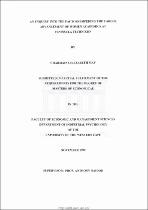| dc.description.abstract | The aim of the study was to determine the factors that impede the career advancement of women academics at Peninsula Technikon, an academic institution in South Africa. There are many variables which need to be addressed systematically, but the present research focused on two factors: to determine whether women academics at the institution experienced difficulty in balancing career and family demands (role salience), and to determine which barriers impacted on the career advancement of women academics at the institution. Research interest in the influence of gender on advancement was stimulated by the relative scarcity of women at the top echelon of academic institutions. Women continue to be underrepresented among institutions of higher education and concentrated in the lower ranks, despite legislative advances and affirmative action. Studies indicated that many personal, social, and situational factors contribute to women being
underrepresented in the higher echelons of the academic hierarchy and experiencing more occupational barriers in their academic careers than males. Family responsibilities have been reported as a significant obstacle to the advancement of women in the past. Many
professional women find themselves trying to satisfy the responsibilities of a demanding career and home life. The study investigated the level of participation, commitment and role value realisation reported by women academics at the institution compared to the normative data gathered on the Life Role Inventory (LRI). The relative influence of participation, commitment and role value realisation of home/family and working functions for women academics were also contrasted. The study also investigated the barriers experienced by women
academics compared to the normative data gathered on the Career Barriers Inventory-Revised scales (CBI-R). All seventy-three women academics at the institution were solicited to participate in the study. The sample of women academics (n = 43) was distributed within the Science, Engineering, and Business Faculties. A demographic questionnaire was designed by the researcher to obtain the demographic data relevant to the sample description and the family situation, educational level, research involvement, working experience, and departmental location of the respondents. The CBI-R was used to determine the barriers that impacted on the career advancement of women academics at the institution. The LRI was used to address the question whether women academics at the institution experienced any difficulty in balancing career and family roles. The research findings suggested that respondents were less likely to indicate their experience of tension/dissatisfaction with their career advancement in the direct, discrete questions. However, they were likely to express themselves more openly on the items of the career barrier scales. Women academics in the present study indicated greater experience of barriers to their career advancement than college students of the standardised sample on all, but one of the thirteen career barrier sub-scales, inspite of
their more advanced stage of career development. The results of the present study confirmed that women academics at the institution
experienced greater participation in the work role compared to the home and family role, but were more committed to the home and family role than to the work role. Although it was predicted that women academics in general have a stronger commitment to the work role than to the home and family role, women academics in the present study evidenced more commitment towards the role of home and family than to the work role. The findings indicated that there was no significant difference between value expectations of the work role and value expectations of the home and family role for women academics. Although it was predicted that professional women in general have higher value expectations of the work role than the home and family role, women academics in the present study evidenced no difference between the two roles. | en_US |

